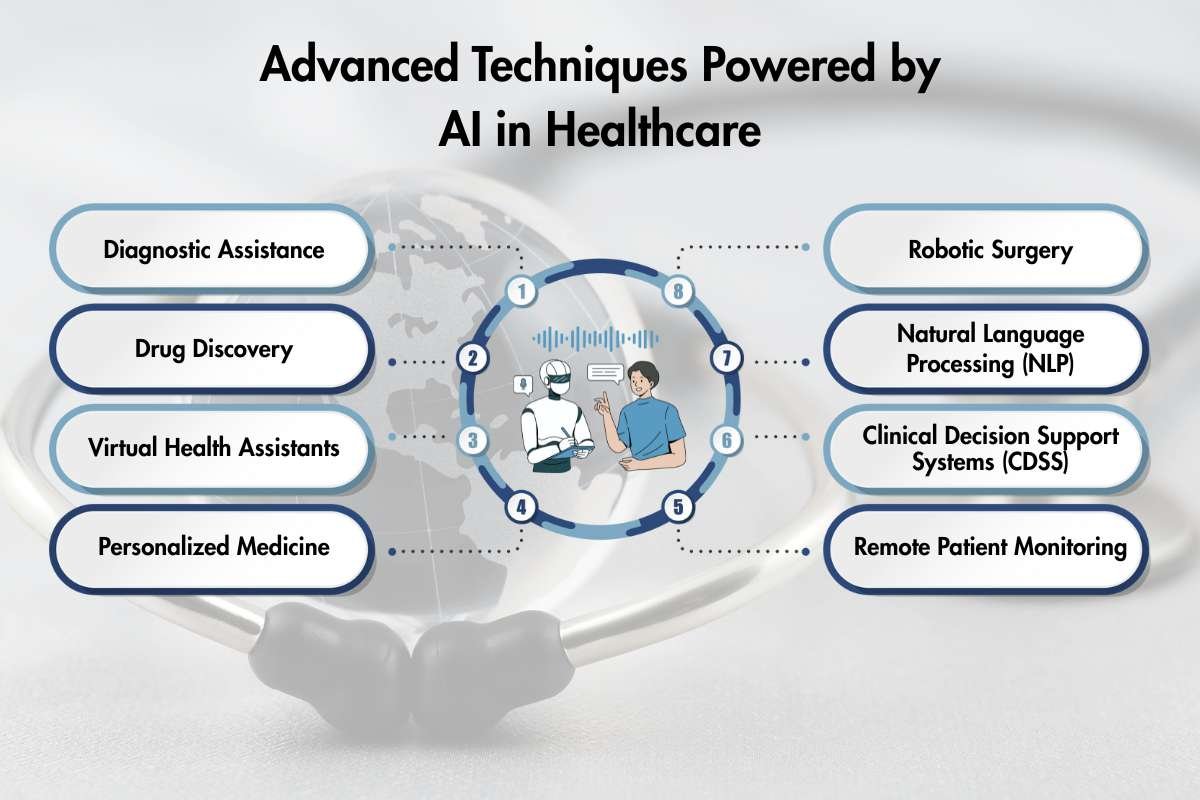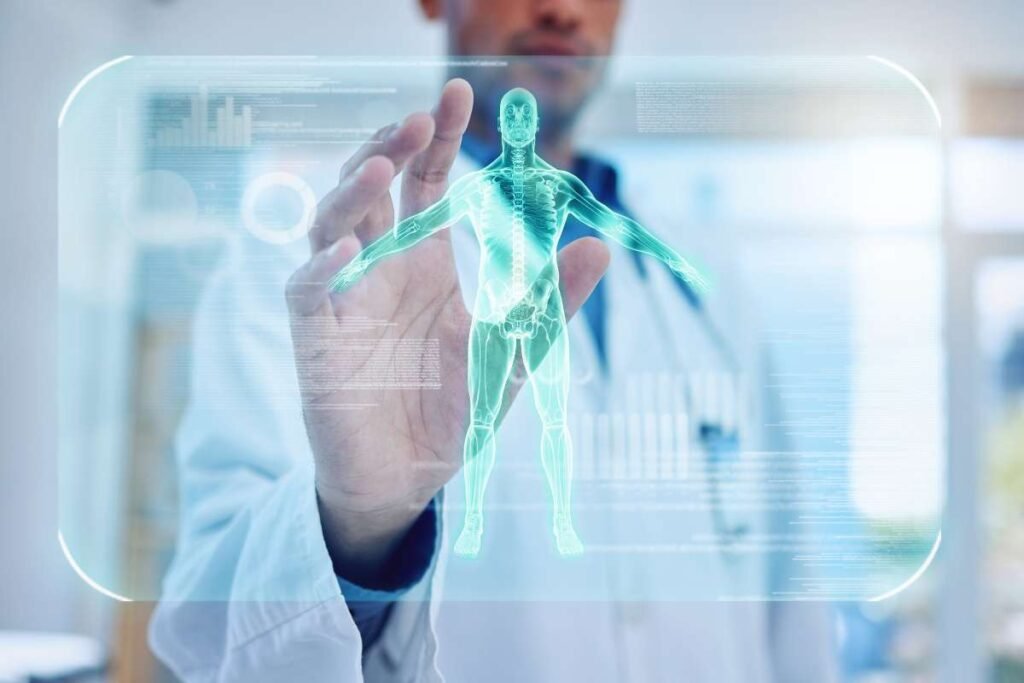Not long ago, people saw AI as a futuristic idea. Today, professionals have widely adopted AI in healthcare, transforming how hospitals operate. Doctors and nurses now use advanced technology to analyze patient data and support clinical teams in making faster and more accurate decisions.
AI is evolving daily, with many possibilities opening up for its integration. It can scan thousands of medical records in seconds and help predict patient diagnoses. What once required long hours of manual work can now be completed in minutes, with higher accuracy and better outcomes. With the help of advanced techniques, healthcare professionals can now perform effective diagnoses.
In this article, we will discuss how AI in healthcare is taking a step forward in helping improve efficiency and creating a more personalized approach to care.
How AI is Advancing Healthcare ?

Data is everywhere. Processing vast amounts of medical data efficiently and accurately is the need of the hour. The integration of AI in healthcare has been steadily progressing for these reasons. Aging populations, increasing diseases, and the need for treatment are common challenges that healthcare systems are struggling with. AI aids in improving the accuracy of the diagnoses, smoothens administrative tasks, and enables predictive analytics.
For instance, AI algorithms can analyze electronic health records (EHRs) to identify patterns and predict patient outcomes. This allows for early intervention and improved care management. Automating regular tasks with this capability helps healthcare providers improve workflows and provide the best care for patients.
Advanced Techniques Powered by AI in Healthcare

AI is influencing various aspects of medical practice due to the evolution of advanced technology.
The following are the advanced techniques influenced by AI in healthcare:
1. Diagnostic Assistance:
AI-powered tools improve diagnostic accuracy by analyzing medical images such as X-rays, MRIs, and CT scans. These tools can detect anomalies that might get dodged by the human eye. This leads to earlier and more accurate diagnoses. For example, AI algorithms have demonstrated proficiency in identifying conditions like cancer and retinal diseases, matching or even surpassing human experts in some cases.
2. Drug Discovery:
The old-school drug discovery process is time-consuming and expensive. AI analyzes the vast datasets to identify potential drug candidates and designs clinical trials, thus speeding up the diagnosis. This accelerates the development of new treatments and reduces associated costs, helping more patients access innovative therapies faster.
3. Virtual Health Assistants:
AI-driven virtual assistants and chatbots improve patient engagement by providing 24/7 support. They can answer health-related queries, schedule appointments, send medication reminders, and monitor patient symptoms. This continuous support enhances patient adherence to treatment plans and reduces the need for in-person consultations, especially for routine or follow-up care.
4. Personalized Medicine:
AI enables the development of personalized treatment plans by analyzing genetic, clinical, and lifestyle data. AI can easily understand a patient’s profile and predict how they respond to specific treatments. This is particularly useful in treating complex conditions like cancer or autoimmune diseases, where individual responses can vary widely.
5. Robotic Surgery:
AI-integrated robotic systems assist surgeons in performing complex procedures with greater precision and control. These systems can analyze data from previous surgeries to improve techniques and reduce complications. Surgeons are still in charge, but the machines provide better visualization and steadier hands.
6. Natural Language Processing (NLP):
AI utilizes NLP to interpret and analyze unstructured clinical notes and documentation. This facilitates better information retrieval, improves clinical decision-making, and enhances the overall efficiency of healthcare delivery. It can even reduce burnout by easing documentation workloads for healthcare professionals.
7. Clinical Decision Support Systems (CDSS):
AI-driven CDSS tools assist clinicians in making evidence-based decisions by offering recommendations based on the latest research and patient data. These systems can alert physicians to potential drug interactions, suggest diagnostic tests, or highlight alternative treatment paths while adapting to individual patient histories. This helps ensure safer, more accurate care at every step.
8. Remote Patient Monitoring:
With the help of AI, wearable devices and home-monitoring tools are becoming more innovative and proactive. These systems can detect irregular heart rhythms, monitor glucose levels, track sleep patterns, and alert healthcare providers to early signs of deterioration. This kind of continuous, AI-supported monitoring can make the difference between a quick adjustment and a medical emergency for patients with chronic conditions.
Making Healthcare More Personal
One of the most promising aspects of AI in healthcare is its ability to personalize patient care. AI can identify specific risk factors and recommend preventive measures by analyzing individual health data. This proactive approach improves health outcomes and empowers patients to take an active role in managing their health.
Moreover, AI facilitates continuous monitoring of patients through wearable devices and remote sensors. These technologies collect real-time data on vital signs and other health indicators, enabling early detection of potential health issues and timely interventions.
Challenges and Responsibilities
Despite its numerous benefits, the implementation of AI in healthcare presents challenges that must be addressed. Data privacy and security are paramount, as AI systems require access to sensitive patient information. It’s crucial to follow the rules and protect against data leaks.
Furthermore, AI algorithms must be transparent and free from biases that could lead to disparities in care. Continuous monitoring and validation of AI systems are necessary to maintain their reliability and fairness.
The Future of AI in Healthcare

The future is promising, with ongoing advancements poised to transform the industry further. Emerging technologies such as machine learning, deep learning, and predictive analytics will continue to enhance diagnostic accuracy, treatment efficacy, and patient engagement.
As AI becomes more integrated into healthcare systems, collaboration between technology developers, healthcare professionals, and policymakers will be crucial to ensure that AI solutions are ethical, equitable, and centered around patient needs.
Conclusion
The integration of AI in healthcare is one of the smart moves made. It helps the doctors and influences the whole patient care experience. From early detection of diseases to faster drug discovery and more personalized treatments, AI is bringing real, tangible benefits to patients worldwide. The critical thing to remember is that AI is just a tool. It works best when it supports the human side of medicine, like the kindness, understanding, and judgment that only doctors can offer.
Also Read :- Medical Schools Embrace AI Education to Prepare Future Physicians









